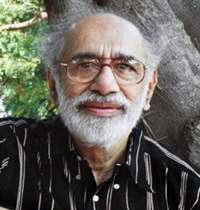Sundara Ramaswamy
Sundara Ramaswamy (30 May 1931 – 15 October 2005[1]) was an Indian novelist and exponent of Tamil modern literature from Thazhuviya Mahadevarkoil, Kanyakumari district,Tamil Nadu. Ramaswamy began his literary career translating Thakazhi Sivasankara Pillai's Malayalam novel, Thottiyude Makan into Tamil and writing his first short story, "Muthalum Mudivum", which he published in Pudimaipithan Ninaivu Malar.
Sundara Ramaswamy | |
|---|---|
 | |
| Born | May 30, 1931 Kanyakumari, Tamil Nadu |
| Died | October 15, 2005 (aged 74) United States |
| Occupation | Writer |
Early years
Sundara Ramaswamy spent his childhood in Kottayam, Travancore, where his father worked as a Burmah Oil agent. Coming from a Tamil family, he spoke the language, but as he lived in Travancore, he only learned to read and write in Malayalam.[2] His father decided to move to Nagercoil, Kanyakumari in 1939. He continued his schooling there, but was generally considered to be a poor student. Kanyakumari then was still a part of Kerala, so his education continued in Malayalam.
At ten years old, he developed rheumatoid arthritis, and remained ill for the next five or six years. Often bedridden, his schooling was interrupted regularly until he discontinued it altogether.[3] He taught himself Tamil from the age of 18, and became exposed to writing from the magazine Manikodi, and famous Tamil writers such as Na. Pitchamurthy and C.S. Chellappa. He was particularly influenced by Pudumaipithan.[2]
Career
At 20, he began his literary career, translating Thakazhi Sivasankara Pillai's Malayalam novel, Thottiyude Makan into Tamil[3] and writing his first short story, 'Muthalum Mudivum', which he published in Pudimaipithan Ninaivu Malar. He was influenced by the works of contemporary thinkers such as Gandhi, Periyar, Sri Aurobindo, Ramakrishna Paramahamsa, Ram Manohar Lohia, J. C. Kumarappa and J.Krishnamurty.[1] In 1952, he began to be influenced by marxist theory after meeting the Communist T. M. C. Raghunathan, editor of the magazine Shanti.[3] He joined the editorial-board of Saraswathi, edited by Vijayabhaskaran, who was also a Communist.[4] He met the editor M.Govindan in 1957 and they became friends.[1]
Short stories and Novels
The majority of his early short stories were published in the magazines Sarawathi and Santhi, although he also wrote several collections, among them Akkaraic chimaiyil (On the Shores Beyond, 1959) and Pitatchatam (Offerings,1964)[5] Oru Puliamarathin Kathai (The Story of a Tamarind Tree, 1966) was his first novel.[6] It received critical acclaim, and is now regarded as a groundbreaking classic of Tamil literature. He edited and published a literary magazine called Kalachuvadu [2] Ramaswamy suspended active writing for nearly six years; and when he resumed in 1973,[3] his style had evolved. It was in this phase that he wrote the short stories in Pallikutt takhihal (The Palanquin Bearers), the book of novellas Tiraikal ayiram (Thousand curtains,1975) and later the novel J.J. Silakuripukal (J.J. Some Notes) in 1988.[7] He published his last novel, Kuzhanthaigal, Pengal, Aangal (Children, Women, Men) in 1995.
Poetry
He wrote his first poem "un kai nagam" in 1959, using the pseudonym 'Pasuvayya'[2] and publishing it in Ezhuthu. Nadunisi nayagal (Midnight dogs) was published in 1975 followed by Pasuvayya kavithagal (Pasuvayya poems).[5] Although his earlier poems used structured language, they later became more spontaneous. His poetry is collected into the book 107 Kavithaikal.[1]
Translation Work
He has translated from Malayalam into Tamil two of Thakazhi Sivasankara Pillai's books Chemmeen and Thottiyude Magan[6] and short stories by Basheer, Karoor Neelakanta Pillai and M. Govindan.[8]
Critical writing
He wrote Na.Pichamoorthiyin Kalai marabum manitha neyamum, a book of criticism on N.Pichamoorthi's literary works. Analysing the author's poetry and short stories in depth, Ramasamy describes how Pichamoorthi has contributed to free verse poetry with his simple words and philosophy, and defines how Pichamoorthi has set the grammar on how free verse poetry should be, in comparison to many modern poets. The book was released in April 1991 by Vanathi publications.
Translations of works
Oru Puliamarathin Kathai has been translated into English (Tale of a Tamarind Tree, Penguin India, New Delhi), Hindi, Malayalam and Hebrew.[9]
Penguin India has released a new translation of Oru Puliyamarathin Kadai titled Tamarind History. A translation of Kuzhanthaikal, Pengal, Aangal was also released, titled Children, Women, Men.[2][10]
Death
He died in the United States from pulmonary fibrosis in 2005, aged 74. He is survived by a son and two daughters.[8]
Awards and Honours
He received the Kumaran Asan Memorial Award in 1988; the Iyal Award from The Tamil Literary Garden in 2001[11] and the Katha Chudamani Award in 2004[4][9]
References
- ""One Hundred Tamils of the 20th Century"". Tamil nation. 22 June 2004. Retrieved 21 May 2018.
- Swami, Sridala (13 July 2013). "No longer at ease". livemint. Retrieved 3 September 2018.
- Rāmacāmi, Cuntara (2003). J.J., Some Jottings. Katha. pp. Introduction. ISBN 9788187649267 – via Google books.
- "Novel as critique". The Hindu. India. 4 January 2004.
- Lal, Mohan, ed. (1992). "Sundara Ramaswamy". Encyclopaedia of Indian Literature: Sasay to Zorgot. 5. Sahitya Akadem. pp. 4225–4226. ISBN 9788126012213.
- "Milestones in Tamil literature". The Hindu. Madurai, India. 27 August 2003.
- "Novel as Debate". Frontline. India. 2 November 2012.
- ""Sundara Ramaswamy"". Nettv4u. Retrieved 21 May 2018.
- "Sundara Ramaswamy dead". The Hindu. Chennai, India. 16 October 2005.
- "Translation Rights Catalogue". Kalachuvadu Publications, India. Retrieved 15 September 2018.
- "2001 Iyal Award". Tamil Literary garden. Retrieved 26 July 2013.